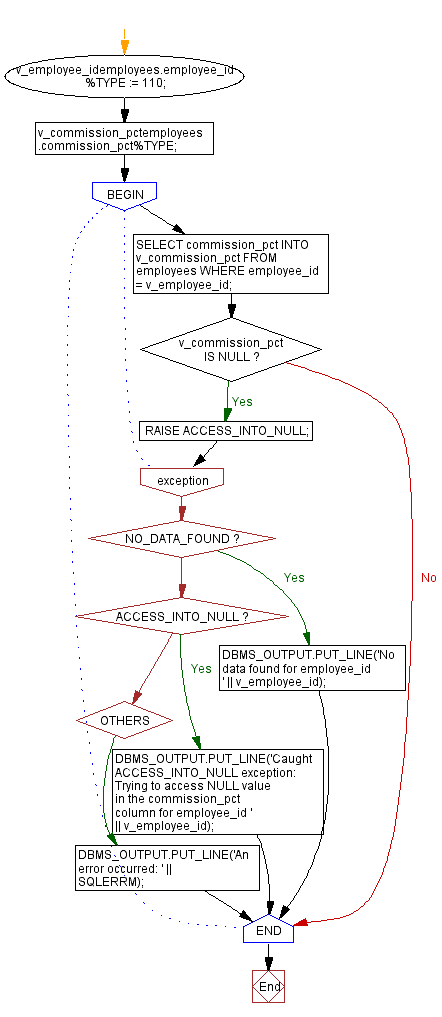Handling ACCESS_INTO_NULL exception in PL/SQL
PL/SQL Exception Handling: Exercise-15 with Solution
Handle the ACCESS_INTO_NULL exception when trying to access a NULL record.
Sample Solution:
Table: employees
employee_id integer first_name varchar(25) last_name varchar(25) email archar(25) phone_number varchar(15) hire_date date job_id varchar(25) salary integer commission_pct decimal(5,2) manager_id integer department_id integer
PL/SQL Code:
DECLARE
v_employee_idemployees.employee_id%TYPE := 110;
v_commission_pctemployees.commission_pct%TYPE;
BEGIN
SELECT commission_pct INTO v_commission_pct
FROM employees
WHERE employee_id = v_employee_id;
IF v_commission_pct IS NULL THEN
RAISE ACCESS_INTO_NULL;
END IF;
EXCEPTION
WHEN NO_DATA_FOUND THEN
DBMS_OUTPUT.PUT_LINE('No data found for employee_id ' || v_employee_id);
WHEN ACCESS_INTO_NULL THEN
DBMS_OUTPUT.PUT_LINE('Caught ACCESS_INTO_NULL exception: Trying to access NULL value in the commission_pct column for employee_id ' || v_employee_id);
WHEN OTHERS THEN
DBMS_OUTPUT.PUT_LINE('An error occurred: ' || SQLERRM);
END;
Sample Output:
Caught ACCESS_INTO_NULL exception: Trying to access NULL value in the commission_pct column for employee_id 110
Explanation:
The said code in Oracle's PL/SQL that demonstrates how to handle the ACCESS_INTO_NULL exception specifically and produced an appropriate message for the user.
A variable v_employee_id is declared and assigns it a specific employee ID 110 and another variable v_commission_pct is declared to store the commission percentage for the employee.
The SELECT statement retrieves the commission_pct value from the employees table against the given employee ID. If the commission_pct is NULL, the code raises the ACCESS_INTO_NULL exception and it prints a message indicating an attempt to access a NULL value in the commission_pct column for the employee.
The other exception if the NO_DATA_FOUND occurs, a message that indicates no data was found for the specified employee ID. For any other exception, the code outputs a general error message with the SQLERRM function.
Flowchart:

Go to:
PREV : Handling ROWTYPE_MISMATCH exception in PL/SQL.
NEXT : Handling NO_DATA_NEEDED exception in PL/SQL.
Have another way to solve this solution? Contribute your code (and comments) through Disqus.
What is the difficulty level of this exercise?
